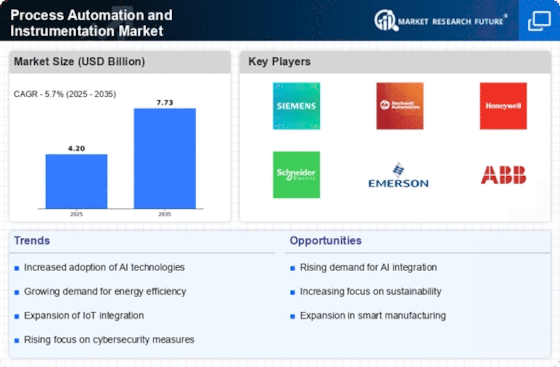Field Instrument
Control Valve and Analyzer
APC
DCS
HMI
MES
PLC
Safety automation & SCADA
Chemicals
Energy & Power
Food & Beverages
North America Process Automation and Instrumentation by InstrumentField Instrument
Control Valve and Analyzer
North America Process Automation and Instrumentation by SolutionAPC
DCS
HMI
MES
PLC
Safety automation & SCADA
North America Process Automation and Instrumentation by End-UserChemicals
Energy & Power
Food & Beverages
US Process Automation and Instrumentation by InstrumentField Instrument
Control Valve and Analyzer
US Process Automation and Instrumentation by SolutionAPC
DCS
HMI
MES
PLC
Safety automation & SCADA
US Process Automation and Instrumentation by End-UserChemicals
Energy & Power
Food & Beverages
CANADA Process Automation and Instrumentation by InstrumentField Instrument
Control Valve and Analyzer
CANADA Process Automation and Instrumentation by SolutionAPC
DCS
HMI
MES
PLC
Safety automation & SCADA
CANADA Process Automation and Instrumentation by End-UserChemicals
Energy & Power
Food & Beverages
Europe Process Automation and Instrumentation by InstrumentField Instrument
Control Valve and Analyzer
Europe Process Automation and Instrumentation by SolutionAPC
DCS
HMI
MES
PLC
Safety automation & SCADA
Europe Process Automation and Instrumentation by End-UserChemicals
Energy & Power
Food & Beverages
Germany Outlook (USD Billion, 2019-2032)
Germany Process Automation and Instrumentation by InstrumentField Instrument
Control Valve and Analyzer
Germany Process Automation and Instrumentation by SolutionAPC
DCS
HMI
MES
PLC
Safety automation & SCADA
Germany Process Automation and Instrumentation by End-UserChemicals
Energy & Power
Food & Beverages
France Process Automation and Instrumentation by InstrumentField Instrument
Control Valve and Analyzer
France Process Automation and Instrumentation by SolutionAPC
DCS
HMI
MES
PLC
Safety automation & SCADA
France Process Automation and Instrumentation by End-UserChemicals
Energy & Power
Food & Beverages
UK Process Automation and Instrumentation by InstrumentField Instrument
Control Valve and Analyzer
UK Process Automation and Instrumentation by SolutionAPC
DCS
HMI
MES
PLC
Safety automation & SCADA
UK Process Automation and Instrumentation by End-UserChemicals
Energy & Power
Food & Beverages
ITALY Process Automation and Instrumentation by InstrumentField Instrument
Control Valve and Analyzer
ITALY Process Automation and Instrumentation by SolutionAPC
DCS
HMI
MES
PLC
Safety automation & SCADA
ITALY Process Automation and Instrumentation by End-UserChemicals
Energy & Power
Food & Beverages
Spain Process Automation and Instrumentation by InstrumentField Instrument
Control Valve and Analyzer
Spain Process Automation and Instrumentation by SolutionAPC
DCS
HMI
MES
PLC
Safety automation & SCADA
Spain Process Automation and Instrumentation by End-UserChemicals
Energy & Power
Food & Beverages
Rest Of Europe Process Automation and Instrumentation by InstrumentField Instrument
Control Valve and Analyzer
REST OF EUROPE Process Automation and Instrumentation by SolutionAPC
DCS
HMI
MES
PLC
Safety automation & SCADA
REST OF EUROPE Process Automation and Instrumentation by End-UserChemicals
Energy & Power
Food & Beverages
Asia-Pacific Process Automation and Instrumentation by InstrumentField Instrument
Control Valve and Analyzer
Asia-Pacific Process Automation and Instrumentation by SolutionAPC
DCS
HMI
MES
PLC
Safety automation & SCADA
Asia-Pacific Process Automation and Instrumentation by End-UserChemicals
Energy & Power
Food & Beverages
China Process Automation and Instrumentation by InstrumentField Instrument
Control Valve and Analyzer
China Process Automation and Instrumentation by SolutionAPC
DCS
HMI
MES
PLC
Safety automation & SCADA
China Process Automation and Instrumentation by End-UserChemicals
Energy & Power
Food & Beverages
Japan Process Automation and Instrumentation by InstrumentField Instrument
Control Valve and Analyzer
Japan Process Automation and Instrumentation by SolutionAPC
DCS
HMI
MES
PLC
Safety automation & SCADA
Japan Process Automation and Instrumentation by End-UserChemicals
Energy & Power
Food & Beverages
India Process Automation and Instrumentation by InstrumentField Instrument
Control Valve and Analyzer
India Process Automation and Instrumentation by SolutionAPC
DCS
HMI
MES
PLC
Safety automation & SCADA
India Process Automation and Instrumentation by End-UserChemicals
Energy & Power
Food & Beverages
Australia Process Automation and Instrumentation by InstrumentField Instrument
Control Valve and Analyzer
Australia Process Automation and Instrumentation by SolutionAPC
DCS
HMI
MES
PLC
Safety automation & SCADA
Australia Process Automation and Instrumentation by End-UserChemicals
Energy & Power
Food & Beverages
Rest of Asia-Pacific Process Automation and Instrumentation by InstrumentField Instrument
Control Valve and Analyzer
Rest of Asia-Pacific Process Automation and Instrumentation by SolutionAPC
DCS
HMI
MES
PLC
Safety automation & SCADA
Rest of Asia-Pacific Process Automation and Instrumentation by End-UserChemicals
Energy & Power
Food & Beverages
Rest of the World Process Automation and Instrumentation by InstrumentField Instrument
Control Valve and Analyzer
Rest of the World Process Automation and Instrumentation by SolutionAPC
DCS
HMI
MES
PLC
Safety automation & SCADA
Rest of the World Process Automation and Instrumentation by End-UserChemicals
Energy & Power
Food & Beverages
Middle East Process Automation and Instrumentation by InstrumentField Instrument
Control Valve and Analyzer
Middle East Process Automation and Instrumentation by SolutionAPC
DCS
HMI
MES
PLC
Safety automation & SCADA
Middle East Process Automation and Instrumentation by End-UserChemicals
Energy & Power
Food & Beverages
Africa Process Automation and Instrumentation by InstrumentField Instrument
Control Valve and Analyzer
Africa Process Automation and Instrumentation by SolutionAPC
DCS
HMI
MES
PLC
Safety automation & SCADA
Africa Process Automation and Instrumentation by End-UserChemicals
Energy & Power
Food & Beverages
Latin America Process Automation and Instrumentation by InstrumentField Instrument
Control Valve and Analyzer
Latin America Process Automation and Instrumentation by SolutionAPC
DCS
HMI
MES
PLC
Safety automation & SCADA
Latin America Process Automation and Instrumentation by End-UserChemicals
Energy & Power
Food & Beverages

















Leave a Comment